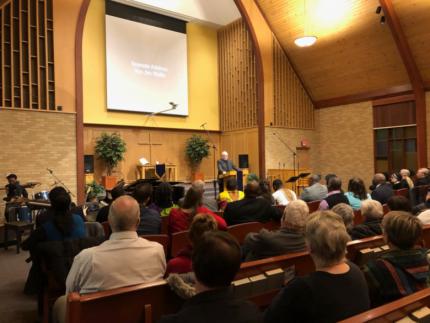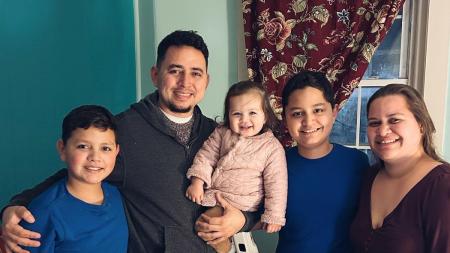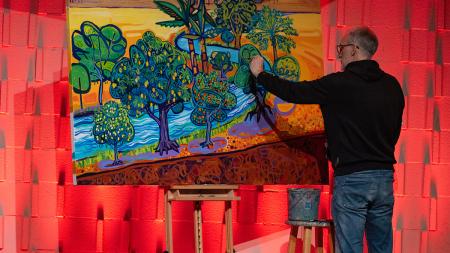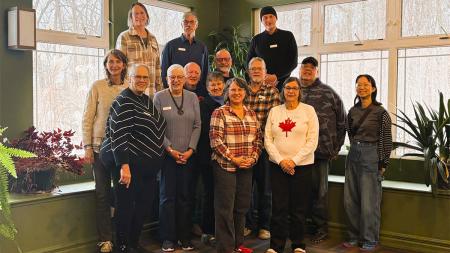Churches Respond to Martin Luther King, Jr.’s Question: ‘Where Do We Go from Here?’

Rev. Jim Wallis speaks at the MLK commemoration at Millbrook CRC.
Kelsey Herbert
Less than a year before his assassination, Rev. Martin Luther King, Jr., delivered a speech on Aug.16, 1967, to the Southern Christian Leadership Conference in which he asked the question, “Where do we go from here?”
It was in this spirit that over 300 members from congregations in the Grand Rapids, Mich., area gathered at Millbrook Christian Reformed Church on Jan. 15 to celebrate the life of Martin Luther King and to ask this question of themselves today.
Rev. Wayne Coleman, Millbrook’s pastor, welcomed attendees to this third annual Martin Luther King Jr. Day gathering sponsored by the CRC Office of Race Relations and the Office of Social Justice. While many came to hear the keynote from Rev. Jim Wallis, founder and president of Sojourners, this dynamic evening was filled with singing, liturgical dances, a spoken word performance, and action steps.
As folks rushed in late because of snowy conditions and a full parking lot, they were greeted with the joyful sounds of a choir led by Nate Glasper, director of the Calvin College Gospel Choir.
Rev. Emmett Harrison of Oakdale Park CRC, Grand Rapids, reminded the audience that it was music that fueled the civil rights movement and that today we have additional ways of continuing the struggle, such as spoken word and hip hop.
He then introduced LeMarr Jackson, youth director at Madison Square CRC, Grand Rapids, and Scott Hofman, youth leader, who went on to deliver a powerful spoken word poem responding to the question “Where do we go from here?”
They challenged the audience to recognize the tendency to focus on King’s call for nonviolence and to love one another while forgetting the unpopular, hard truths he preached. Through their words they invited the audience to “repent for the silence” and called them to stand united against racism.
In his 1967 speech, Martin Luther King, Jr., called for a “divine dissatisfaction” until justice prevails. Rev. Reggie Smith, director of the Office of Race Relations and the Office of Social Justice, introduced keynote speaker Rev. Jim Wallis, saying, “I think these words describe Jim Wallis—there is a prophet under there.”
Wallis founded Sojourners in 1971 to help Christians put their faith into action for social justice — including the end to racism in the U.S.
Wallis began his address with lament, stating, “We are in a time when a nation’s soul is at stake,” but then quickly moved the audience to witness hope in the midst of turmoil, calling the third annual MLK gathering at Millbrook a sign of this hope.
Framing the conversation, he said, “Racism and poverty are both central issues of the gospel of Jesus Christ; they are religious issues, not political ones.”
Recognizing that racism is a theological issue and that the body of Christ is made up of all races and cultures, he posed the question, “Corinthians says when one part of the body suffers, we are all supposed to feel pain. When black and brown bodies suffer, do the white bodies feel pain?”
Drawing from the book of Genesis, he proclaimed that all are made in the image and likeness of God and that racism is a sin against God and all of God’s children. He continued, “Racism is throwing out imago dei, the image of God.
It was Christians who said, “‘We can’t do this to people [slavery] if they are made in the image of God, so we’ll say they aren’t.’ Racism is America’s original sin, and it still lingers on.”
He went on to talk about the structural and systematic nature of racism in the United States and challenged the crowd to think of racism beyond individual acts against one another.
He said, “This original sin lingers on in criminal justice, housing, and more. Racism …. is more than individual behavior and hostility — that is our privatized, distorted theology that’s used to cover it up. Racism is systematic and structural and harms people of color in tangible ways.”
He continued by saying that racial segregation isn’t an accident but rather an intentional outcome based on policies such as redlining and unfair banking and housing practices — and as a result, people of different races don’t have relationships with one another. He said that we do not know each other’s stories, and he questioned, “How have we let these structures go against [the Word of God in] Corinthians?”
Considering King’s “Where do we go from here?” question, Wallis invited the audience to imagine the church being known for and united against the sin of racism. With hope he shared about an anti-racism gathering in Washington, D.C., last week where faith leaders from many backgrounds recognized the new urgency to work together to defeat racism.
In some of his closing words Wallis also quoted MLK: “Human progress is neither automatic nor inevitable . . . Every step toward the goal of justice requires sacrifice, suffering, and struggle; the tireless exertions and passionate concern of dedicated individuals,” And, Wallis quoted King, “We must accept finite disappointment, but never lose infinite hope.”
The evening concluded with a dance performed by youth from Grace CRC, Grand Rapids, to the song “Glory” by John Legend — and with a prayer that included the words “Let us be dissatisfied with the status quo of this world, that we might live in the light of your glory, Lord, arm in arm. To do justice, to love mercy, and to walk humbly with you, O God, that we might be known by the God who unites us rather than the sins that divide us.”


